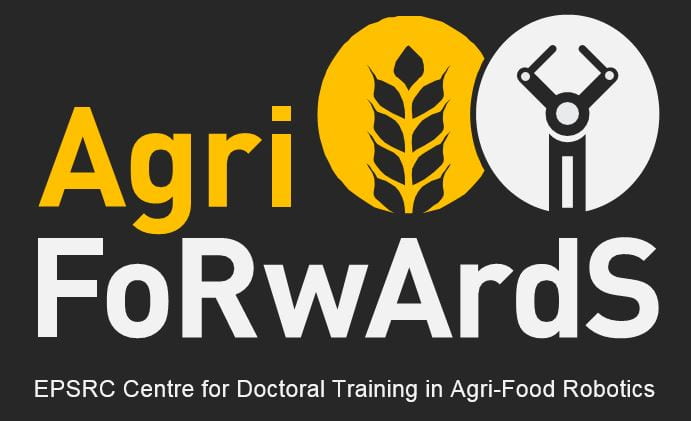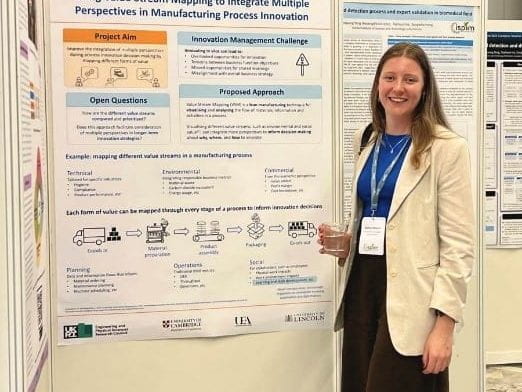By Bethan Moncur
This summer, I had the privilege of attending three international academic events: the ISPIM Innovation Conference, the Uncertainty Summer School (hosted by ETH Zürich), and the International Conference on Human-Computer Interaction. Please carry on reading to hear more about the work I presented at each, the key takeaways, and my attempts to mitigate the environmental impact of my travels.
2023 ISPIM Innovation Conference: Innovation and Circular Economy
4-7 June 2023 – Ljubljana, Slovenia
My summer began by attending the annual conference held by the International Society for Professional Innovation Management (ISPIM), a global network of innovation professionals from academia, industry, consulting, and the public sector. The conference was hosted in the beautiful city of Ljubljana, Slovenia, with events in the Cankarjev Dom, Ljubljana Castle, and Tivoli Park.
Over the course of three days, I took part in workshops, engaged with discussion panels, and attended research presentations. I also led a ‘hot topic discussion’ about integrating different perspectives into manufacturing process innovation decisions. During the discussion, we explored the idea of using value stream mapping, a lean manufacturing approach, for different types of value along a manufacturing process. We discussed the challenges of comparing and prioritising different forms of value, such as commercial, environmental, and social value. I also had a poster on display at the conference (pictured), which facilitated interesting connections with other researchers and enabled me to get feedback on early-stage research.
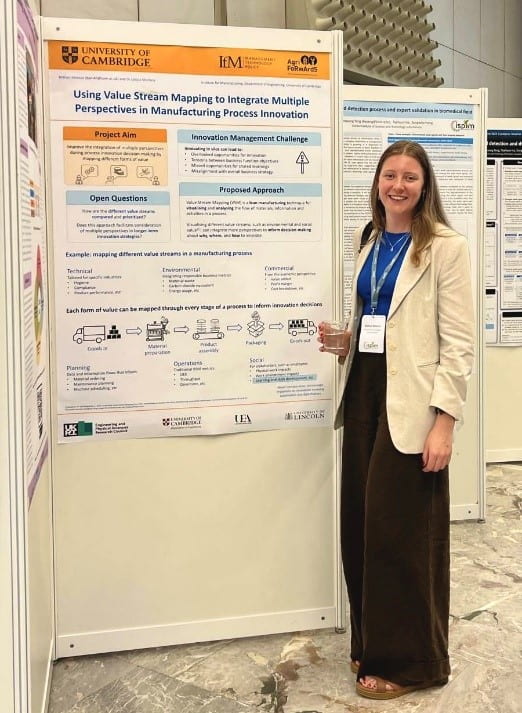
There were two key takeaways from the conference that have been impactful for my PhD already. The first takeaway was learning about different approaches that researchers are taking to investigate knowledge integration. This included learning different methods of evaluating knowledge transfer, the role of multidimensionality in knowledge brokering, and the characteristics of knowledge rejection. The second takeaway was how action research and ethnography can be used for innovation management research. During an interactive workshop, I learned how to choose between different action research methods and the importance of reflexivity during this kind of research.
The conference ended with parallel activities that delegates could choose to participate in. Given my previous research interests in sustainable food packaging, I could not resist a visit to the Ljubljana Regional Centre for Waste Management, RCERO (pictured). The mechanical-biological waste treatment plant is a great example of collaboration to drive transformative change towards a circular economy: the facility serves around a third of the Slovenian population, with less than 5% of residual waste ending up in landfill.
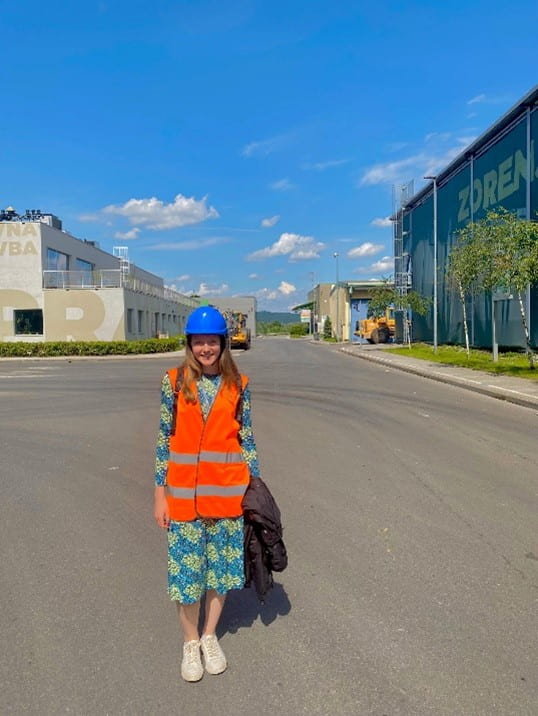
I wanted to avoid flying for conference travel as much as possible, so I travelled to Ljubljana by bus and train. This involved an overnight bus from London to Paris, trains from Paris to Venice, and a bus from Venice to Ljubljana. To make the most of my time abroad, I chose to travel slowly across Italy and take some annual leave. This included stops in Milan, Lake Garda, Verona, Bassano del Grappa, and Venice (not on the RTSG, don’t worry Kate and April 😊). For those looking for train connections across Europe, I recommend checking out the website The Man in Seat Sixty-One, which explains how to travel by train and ferry across Europe and beyond.
Uncertainty Summer School 2023
18-23 June 2023 – Ascona, Switzerland
After the ISPIM conference, I caught an overnight bus from Ljubljana to Zürich to visit my Swiss family on the way to the Uncertainty Summer School. After a brief stay with them, I caught the train to the ETH Zürich Centro Stefano Franscini in Ascona. The summer school was located at the mystical Monte Verità (‘Mountain of Truth’) on the shores of Lake Maggiore – a setting steeped with the history of theosophists and reformers that sought an ‘alternative’ life. The summer school assembled academics from the fields of psychology and management to discuss theories and empirical research on the meaning and effects of uncertainty on individual, team, and organisational processes.

The key takeaways from the summer school are centred on the Ascona Statement on Uncertainty, which asserts that it is important to distinguish between different types of uncertainty (such as aleatory versus epistemic), and that uncertainty can have positive effects as well as negative effects. In addition, I received valuable feedback on a paper during a small group discussion (pictured). The paper explores the process of bringing different perspectives together as a means of ‘dealing with’ uncertainty in technology selection decisions.
The summer school introduced me to new ways of thinking about uncertainty and how to incorporate it into my research. It also introduced me to some amazing researchers, who I look forward to meeting again in the future. My journey back consisted of a scenic train back to Zürich, a high-speed train from Zürich to Paris, and the Eurostar back to London – easy!
25th International Conference on Human-Computer Interaction
23-28 July 2023 – Copenhagen, Denmark
After a quick pit stop back in the UK, I travelled to Copenhagen for HCI International 2023. The conference brings together researchers from all over the world working on human-computer interaction. There were 21 affiliated conferences under the umbrella of HCI International, resulting in a diverse range of topics.
My colleague and I were both presenting papers as part of the 17th International Conference on Augmented Cognition. I presented my paper (pictured) in the final session (Eye-Tracking, BCI, and Wearables in VR, AR, and MR). The paper, titled “Augmented Reality to Reduce Cognitive Load in Operational Decision-Making” is based on my MSc project that I completed at the University of Lincoln in 2022. It presents the results of an exploratory study investigating the effects of augmented reality on perceived ease of participants completing a bin packing optimisation task. The paper found that the presence of an augmented reality decision support system made the task feel easier to participants; however, the change in perceived ease did not translate to changes in task performance.
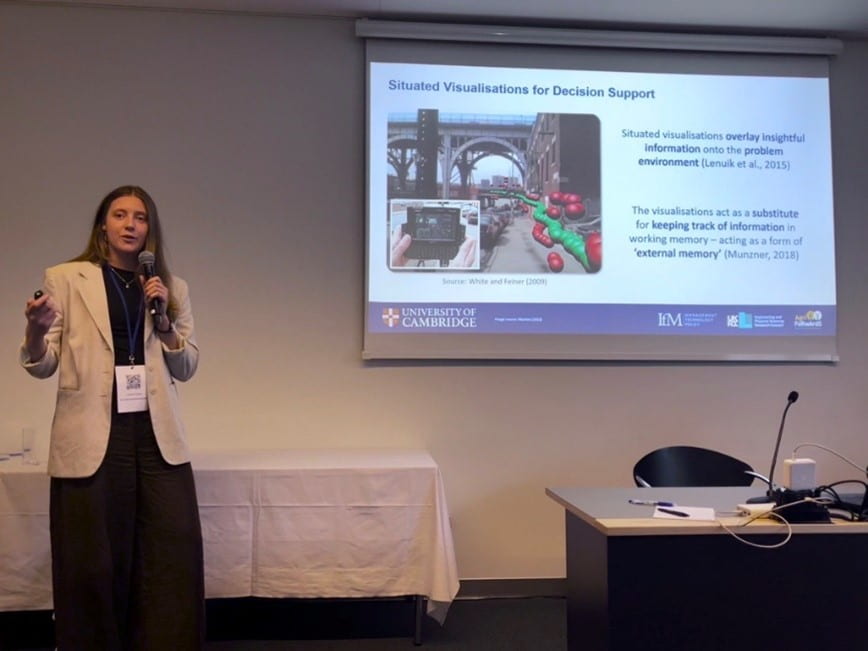
It was a very strange yet rewarding experience to be greeted by people from the other side of the world who had read my paper and answer their questions about my work. In addition to presenting my own work, it was exciting to hear about other closely related research. I learned a lot about eye-tracking techniques and how they may be useful in future work that I conduct to investigate the cognitive effects of extended reality technologies. A highlight of the conference was meeting with Professor Gavriel Salvendy, a pioneer in the field of human factors and ergonomics, to hear his perspective about the PhD journey and how it can be used to support careers in both academia and industry.
I travelled to Copenhagen by train – a long yet rewarding journey. This involved Eurostar to Brussels, three trains through Germany (including a quick coffee stop in Cologne), and a mix of trains and replacement buses across Denmark to reach Copenhagen. To make the most of my visit to Scandinavia, I then took annual leave to visit Sweden. This included a train journey across the famous Øresund Bridge on my way to Stockholm. After an amazing few days in Sweden, I flew back from Stockholm to London. I was sad to ruin my flight-free travel streak, but nevertheless proud of my attempts to reduce my environmental impact. After all, as Chesterton’s saying goes, anything worth doing is worth doing badly.
With massive thanks to Bethan for sharing her experiences with us and writing this fantastic blog post.
